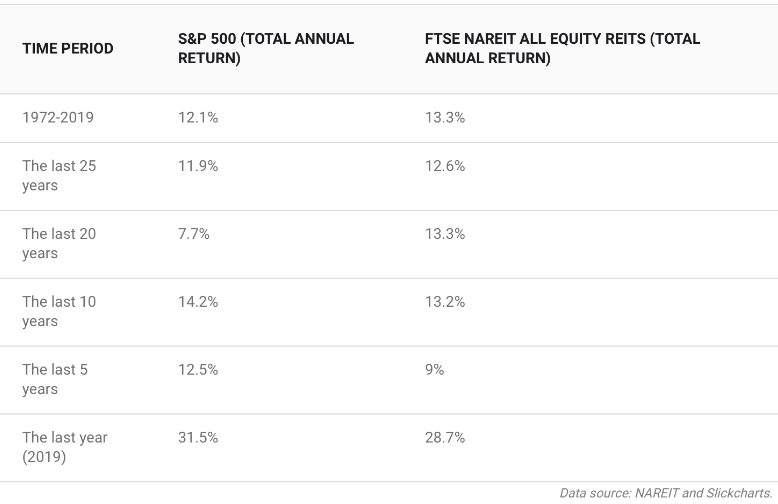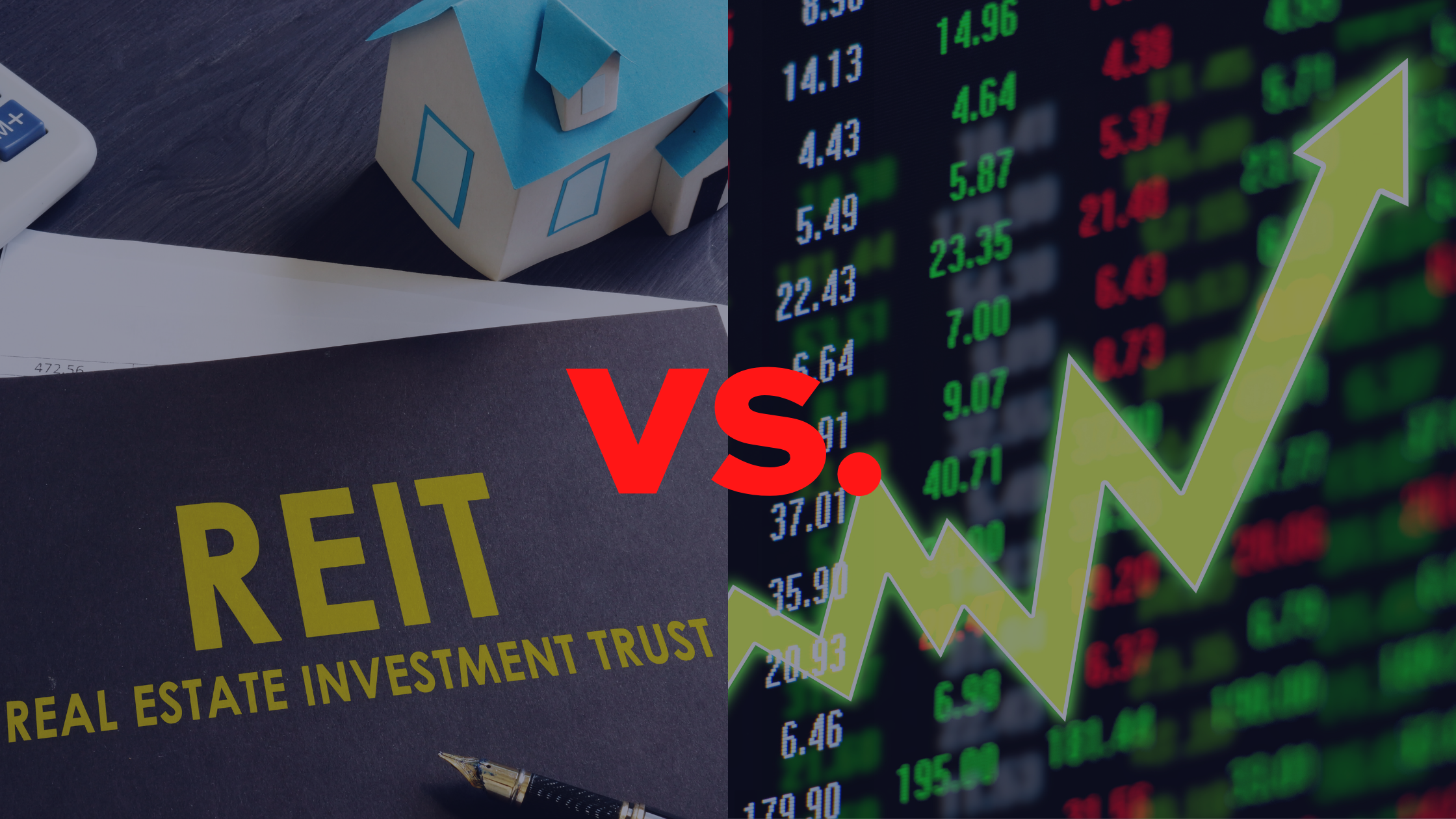REITs vs. Stocks: Which is the Better Investment?
Seasoned investors know this one is a classic throwdown. And for all our trash-talking, we’re forced to admit it: there might just be a few good reasons to include some stocks in your portfolio. But, proud real estate shills that we are, we couldn’t pass up the chance for a good, old-fashioned competition.
So this week, it’s time to find out how REITs and stocks compare, and how they might fit into your portfolio.
Return Rates
Let’s start with the big question: which one puts more cash in your wallet? After all, you might think, an investment is only as good as the checks you can get in the mail.
Turns out, investors are looking at some good news on this one: over the long haul, if you diversify wisely, both options will almost certainly make you money. If you put $100 into the S&P twenty years ago, for instance, you’d have about $500 now—about an 8% annual return if you reinvested your returns.
REITs tell a similar story, just a little bit better:

While real estate and stocks both tend to be profitable over the long run, real estate has historically performed a little better.
And that’s not the only reason your portfolio should include real estate.
Volatility
Stocks are notoriously volatile investments. Just think about the GameStop run-up from last year, or the absolute beating the S&P has taken since January. What’s more, inflation isn’t just looming on the horizon anymore; it’s here, and it’ll probably be here for a hot minute.
For real estate investors, all of that is good news: while some real estate investments track the stock market somewhat closely, they historically overperform when the economy is down and inflation is up.
And some real estate investments are actually counter-cyclical—which means they get more profitable when other investments struggle.
When you think about it, that isn’t especially surprising. The value of a stock is pretty much tied to people’s expectations about the price they’ll be able to sell it for down the road. That, in turn, might be tied to a company’s ability to make a profit—or, more cynically, investors’ expectations about future demand for the stock. But while the first option is a bit more durable than the second one, downturns are bad news for both.
On top of that, stock prices can fluctuate when famous people tweet, market-makers change their policies, or some entity wielding outsized market power starts shorting a well-known company.
Real estate just doesn’t have those problems. What it does have going for it is that, when people start panic-selling their securities, they usually don’t stuff the cash into their mattresses. Instead, that money is looking for a home, and real estate is often one of the first places it goes.
Intrinsic Value
One of the reasons real estate tends to be less volatile than stocks is that, historically, it’s been an exceptionally durable store of value.
The reason, again, makes a lot of sense. First, real estate investors own physical, tangible stuff. Even when times are bad and tenants struggle to pay rent, real estate investors end each day holding a tangible asset—land with a building on it—that’s always going to be worth something.
Second, demand for real estate is durable because housing is a basic human need. That means even when real estate values go down, they’re pretty unlikely to disappear altogether. Unlike riskier stocks—or *cough* crypto—demand for real estate is super durable because housing is pretty much the last necessity people forgo when money is tight.
But that discussion of rental income leads to our next point:
Mailbox Money
Whether you’re saving for retirement or just trying to get a little more oomph out of your savings account, one thing you’ll want to consider is how, exactly, your investments make money.
Stocks tend to fall into one of two categories: dividend stocks and non-dividend stocks. These days, dividend stocks don’t tend to send holders especially significant checks, but they can still be useful for investors in some situations. But the lion’s share of money people make from stocks comes from the delta between the price they buy at and the price they sell at.
Real estate has that feature, too—you always hope to be able to sell a building for more than you bought it for—but that’s not the most important way real estate investors make money.
Instead, real estate investors look for passive income from rent payments. Part of that money goes towards expenses—paying the mortgage, funding maintenance, etc. But hopefully, if investors made the right pricing and acquisition calls, some of that monthly income is profit that winds up in investors’ pockets. If the business model works, investors can keep collecting those returns for as long as they hold the asset.
One benefit of that is pretty obvious: two avenues for making money is better than one.
But another, subtler benefit of that arrangement is that real estate investments can earn you profits even when it isn’t a great time to sell. If your building is hovering below the price you paid for it because of a sluggish market, you can always just opt to hold onto it and keep earning passive income until the market perks up. Especially for people in the #FIRE crowd, that’s a big deal.
REITs are User-Friendly
One last point: when you invest in stocks, it’s not enough to pick a stock that’s likely to succeed. You also need to be able to decide when to sell. And as the GME fiasco made clear, timing the market is risky business.
When you invest with a REIT, the situation is totally different: all you have to do is buy in, let someone else do all the work, and get your quarterly check. That’s one great thing about REITs: they fix the biggest problem with investing in real estate, which is that—before REITs were a thing—it was a huge pain. Operating investment-grade properties is a full-time job—and doing that at a scale that allows you to diversify and hedge against risk is a few dozen people’s full-time job.
Investing with a REIT, on the other hand, takes five minutes and a smartphone.
Conclusion
We think REITs belong in everyone’s portfolio. They’re based on our favorite asset class, easy to use, resistant to inflation, and well diversified.
Of course, that doesn’t mean stocks don’t have a place. In fact, the strongest portfolios are usually the best-diversified ones—which means most investors will benefit from a healthy mix of asset types.
When it comes to protecting your portfolio from recessions and inflation, though, we think real estate—especially in the American Heartland—simply cannot be beat. And unless you have a couple million dollars lying around, and a serious inclination to make property management your full-time job, chances are a REIT is the best way to do it.

